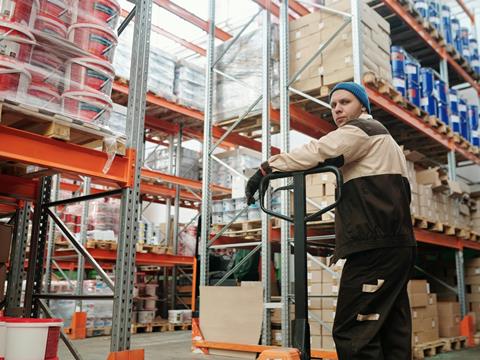
Pressure from governments and the public for companies to adopt reusable packaging is increasing. In this article, Emma Samson from environmental consultancy Searious Business outlines her top 10 commercial reasons why companies should make this switch as soon as possible.
In the halls of government, in boardrooms across industries, and even among neighbours figuring out which bin goes out today, one topic keeps coming up: packaging waste. We all know that the current “make, use, discard” cycle can’t last forever. To protect our planet and our future, we must hold onto our resources for as long as we can. One powerful solution is reusable packaging.
In B2B transport, reusable packaging—like sturdy totes, durable containers, and stackable pallets—has existed for years, yet it still accounts for less than 10% of the market. One key reason is the missed connection between the logistical challenges of circular business models and the untapped potential for profit.
A 2020 study from the Netherlands’ Transition Agenda for Consumer Goods revealed that the views on reverse logistics vary significantly between circular entrepreneurs and logistics providers. While one party sees opportunities because “the truck is driving back empty anyway,” the other party sees opportunities for an extra billable task.
1. Legislative compliance
The upcoming EU Packaging and Packaging Waste Regulation (PPWR) places a significant focus on reusable packaging in transport. By 2030, businesses transporting goods within the same country will be required to use 100% reusable packaging. For cross-border shipments within the EU, the target is 40%, rising to an ambitious 70% by 2040. Embracing reusable packaging now will prepare companies for compliance and give them a head start.
2. Maximized supply chain efficiency
Reusable packaging enhances logistics operations by minimizing the need for constant replacements. Its durability allows it to endure the challenges of transportation, handling, and storage without sacrificing functionality, leading to smoother processes, fewer disruptions, and a more efficient supply chain.
3. Enhanced reputation
Sustainability is no longer a mere buzzword—it’s a powerful differentiator. Adopting reusable packaging signals a company’s commitment to environmental responsibility. Partners, customers, and stakeholders increasingly value businesses that take meaningful steps toward sustainability, making it a key factor in enhancing corporate reputation.
4. Reduced carbon footprint
By opting for long-lasting, reusable containers, logistics companies reduce the need for disposable packaging—fewer discarded boxes, fewer trees cut down, and less plastic produced. These reductions translate to fewer carbon emissions. As ESG (Environmental, Social, and Governance) reporting becomes more critical, reusable packaging helps companies reduce Scope 3 emissions and move closer to net-zero carbon goals.
5. Lower costs
While reusable packaging may require a higher initial investment, it proves cost-effective over time. Unlike single-use packaging, which demands continuous purchasing, reusable solutions pay off with each use. Success parameters, as outlined in this Searious Business report, demonstrate how quickly the savings accumulate once companies adopt and scale these systems.
6. Increased efficiency and worker safety
Reusable packaging simplifies operations. Workers no longer need to spend time breaking down and discarding single-use packaging or dealing with the hazards of nails, staples, or broken pallets. This streamlines workflows, reduces downtime, and lowers the risk of workplace injuries, making the work environment safer and more efficient.
7. Cube efficiencies and space optimization
Reusable packaging is often designed for optimal stacking and cargo space utilization. By maximizing every inch of a shipping container or delivery truck, businesses can transport more goods per load, reducing the number of trips required and cutting transportation costs.
8. Intelligent data gathering
Many reusable packaging systems are equipped with smart technology, such as sensors that monitor conditions like temperature and humidity. This data allows companies to optimize logistics routes, predict maintenance needs, and reduce losses. Early issue detection means fewer costly surprises and more streamlined operations.
9. Brand loyalty and customer experience
Consumers are increasingly drawn to brands that prioritize sustainability. By adopting reusable packaging, logistics companies align themselves with the values of environmentally conscious customers. This fosters deeper relationships and loyalty, leading to long-term customer retention and satisfaction.
10. Competitive differentiation and market leadership
In an industry where differentiation can be difficult, embracing reusable packaging offers a clear advantage. Early adopters position themselves as pioneers in sustainability, setting eco-friendly standards that attract environmentally conscious clients and partners. This not only enhances brand image but also creates a competitive edge in a crowded marketplace.
The global shift toward a circular economy is undeniable, and it’s about more than just environmental stewardship. Reusable packaging presents significant commercial opportunities. Companies that adopt reusable solutions now stand to gain from reduced costs, increased efficiency, and stronger reputations with customers and stakeholders alike. A forward-thinking approach doesn’t just boost short-term profits—it builds long-term resilience in an evolving market. Let’s bring it back.
If you liked this story, you might also enjoy:
The ultimate guide to the Packaging and Packaging Waste Regulation in 2024
How are the top brands progressing on packaging sustainability?
Sustainable Innovation Report 2024: Current trends and future priorities
Everything you need to know about global plastic sustainability regulation














No comments yet